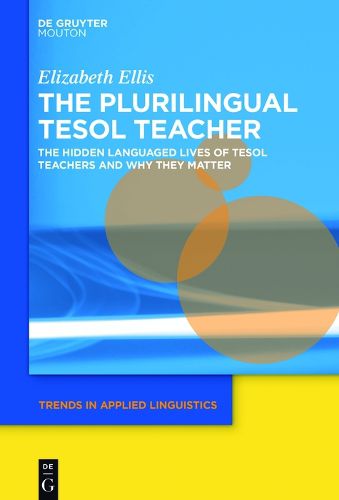The Plurilingual TESOL Teacher: The Hidden Languaged Lives of TESOL Teachers and Why They Matter
Elizabeth Ellis

The Plurilingual TESOL Teacher: The Hidden Languaged Lives of TESOL Teachers and Why They Matter
Elizabeth Ellis
This title is printed to order. This book may have been self-published. If so, we cannot guarantee the quality of the content. In the main most books will have gone through the editing process however some may not. We therefore suggest that you be aware of this before ordering this book. If in doubt check either the author or publisher’s details as we are unable to accept any returns unless they are faulty. Please contact us if you have any questions.
This book introduces a new topic to applied linguistics: the significance of the TESOL teacher’s background as a learner and user of additional languages. The development of the global TESOL profession as a largely English-only enterprise has led to the accepted view that, as long as the teacher has English proficiency, then her or his other languages are irrelevant.
The book questions this view. Learners are in the process of becoming plurilingual, and this book argues that they are best served by a teacher who has experience of plurilingualism.
The book proposes a new way of looking at teacher linguistic identity by examining in detail the rich language biographies of teachers: of growing up with two or more languages; of learning languages through schooling or as an adult, of migrating to another linguaculture, of living in a plurilingual family and many more.
The book examines the history of language-in-education policy which has led to the development of the TESOL profession in Australia and elsewhere as a monolingual enterprise. It shows that teachers’ language backgrounds have been ignored in teacher selection, teacher training and ongoing professional development. The author draws on literature in teacher cognition, bilingualism studies, intercultural competence, bilingual lifewriting and linguistic identity to argue that languages play a key part in the development of teachers’ professional beliefs, identity, language awareness and language learning awareness.
Drawing on three studies involving 115 teachers from Australia and seven other countries, the author demonstrates conclusively that large numbers of teachers do have plurilingual experiences; that these experiences are ignored in the profession, but that they have powerful effects on the formation of beliefs about language learning and teaching which underpin good practice. Those teachers who identify as monolingual almost invariably have some language learning experience, but it was low-level, short-lived and unsuccessful.
How does the experience of successful or unsuccessful language learning and language use affect one’s identity, beliefs and practice as an English language teacher? What kinds of experience are most beneficial?
These concepts and findings have implications for teacher language education, teacher professional development and the current calls for increased plurilingual practices in the TESOL classroom.
This item is not currently in-stock. It can be ordered online and is expected to ship in 7-14 days
Our stock data is updated periodically, and availability may change throughout the day for in-demand items. Please call the relevant shop for the most current stock information. Prices are subject to change without notice.
Sign in or become a Readings Member to add this title to a wishlist.


